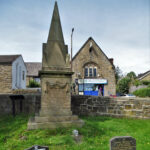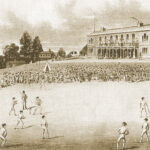11 October 1786: George Yardley, charcoal-burner, dies as he had lived
Sidney Oldall Addy. 1888. A Glossary of Words Used in the Neighbourhood of Sheffield. London: English Dialect Society/Trübner and Co. Get it:
.Unedited excerpt
If an excerpt is used in the book, it will be shorter, edited and, where applicable, translated.
WOOD-COLLIER, sb. a charcoal burner, or a person who cuts wood to be made into charcoal.
The word occurs in the Latin of the Norton Parish Registers as carbonarius lignarius. Mr. Furness has obliged me with the following inscription from a gravestone in Ecclesall wood: ‘In memory of George Yardley, wood collier. He was burnt to death in his cabin in this place October 11th, 1786. William Brookes, salesman; David Glossop, gamekeeper; Thomas Smith, beesom-maker; Sampson Brookshaw, innkeeper.’ It is said that after drinking one night at the house of Brookshaw, the innkeeper, he was found the next morning burnt to death in his cabin. It is supposed that his calcined remains were buried on the spot. Brookes was the wood-salesman. A wood-collier at Hazelford, near Hathersage, had acquired such accuracy of aim in chopping wood that he could spread out his fingers upon a piece of wood, and cleave the wood into lengths by cutting between his fingers. The Sheffield Parish Register, Sep. 3, 1711, records the death of ‘John Green, ground-collier.’
Comment
Comment
Why was he making charcoal when so much coal was available nearby? Maybe Loopy, who worked as a charcoal burner in Hampshire in the 1980s, will be able to answer this.
I have several times heard it said that if a corpse is carried through an enclosure of any kind a right of road is thereby obtained through such enclosure. A writer in the Sheffield Daily Telegraph, June 28, 1888, in describing the death of the wood-collier, whom I have mentioned under that word in the glossary, says:
The accepted version is that after his wife had left him (she had brought him his supper) he is supposed to have gone to sleep, and that a spark from the burning wood caught the cabin, and he was burnt to death, and only his bones were found by the men whose names are on the headstone. The reason he was buried there is said to be that wherever a corpse is carried a right of road can be claimed. Whether this is so or not is a question for the lawyers. A number of larch trees were planted in the shape of the cabin, and were in existence until a few years ago close to the headstone, where a descendant of one of those who found the bones and the present writer were passing a quiet hour under the shadow of the friendly branches from the heat of the sun, when we both fell asleep, and were only awakened by a loud peal of thunder and a deluge of rain.
It need hardly be said here that no legal right could be thus established.
Something to say? Get in touch
Similar
 4 July 1838: 26 girls and boys drown trying to escape via a tunnel from flash flooding in Huskar Colliery, Silkstone, Barnsley, after the steam lifts fail during a rainstorm
4 July 1838: 26 girls and boys drown trying to escape via a tunnel from flash flooding in Huskar Colliery, Silkstone, Barnsley, after the steam lifts fail during a rainstorm
Comment
Comment
Shirley is set in 1811 and 1812, and Luddism became a serious threat in the West Riding in early 1812. Easter Sunday was 29 March that year, so Whit Tuesday was 19 May – although Charlotte Brontë’s imagination, perhaps inspired by weather reports in the Leeds Mercury, which she consulted extensively, locates it in the last week of May. John Lock and Canon W.T. Dixon say (p.63) that the scene reworks a confrontation between Patrick Brontë and a drunk when he led the Whitsun procession in Dewsbury in 1810 (Lock 1965), but Herbert Wroot (p.78) has found in the Dewsbury Reporter of 12 December 1896 the report of an interview conducted by P.F. Lee in which the Rev. James Chesterton Bradley, the original of “Mr. Sweeting,” says that Charlotte Brontë reused more or less literally an actual episode:
At the head of the steep main street of Haworth is a narrow lane, which on a certain Whitsuntide was the scene of a similar event to the one related in this seventeenth chapter of ‘Shirley.’ The Church School procession had defiled into the lane, ‘had gained the middle of it,’ when ‘lo and behold! another – an opposition procession’ – was entering the other end of the lane at the same time, ‘headed also by men in black.’
It was interesting, Mr. Lee went on to say, “to hear from Mr. Bradley how Patrick Bronté, seeing the situation, at once assumed the offensive, and charging the enemy with his forces soon cleared the way.”
Wroot also says that “immediately upon the publication of the novel, Briarfield was identified, by all acquainted with the district, as Birstall” (Wroot 1966).
Something to say? Get in touch
Search
Donate
Music & books
Place-People-Play: Childcare (and the Kazookestra) on the Headingley/Weetwood borders next to Meanwood Park.
Music from and about Yorkshire by Leeds's Singing Organ-Grinder.



 Bluesky
Bluesky Extwitter
Extwitter